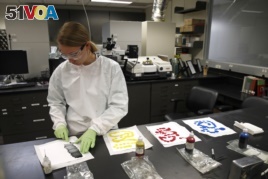21 July, 2019
A large collection of ink samples fills storage space at a small laboratory in Washington, D.C.
The samples are kept inside a mix of soft, plastic bottles and small glass containers. To the untrained eye, they are just a lot of dark liquids with strange names like "moldy sponge" or "green grass."
But to the United States Secret Service agents who use the ink samples, they could provide information that saves the life of the president. Agents say the samples also could help them stop criminals from reproducing money illegally.
The ink library at the laboratory has more than 15,000 samples. They come from writing instruments and printing machines dating back more than 85 years. The collection is the result of one man, Antonio Cantu. He started collecting samples in the 1960s.
Cantu was a well-known investigator and former chief chemist at the Secret Service. He died unexpectedly last year. The agency recently honored Cantu by naming the laboratory after him.

In this June 27, 2019 photo, physical scientist Ashley Wright creates sample sheets from different colors of inkjet printer ink in the International Ink Library at the U.S. Secret Service headquarters building in Washington, DC.
The Secret Service uses the library to investigate letters threatening the president and other high-level U.S. officials. It also studies unlawful copies of official documents, letters written by kidnappers, and objects of historical interest.
Scott Walters is a researcher who worked with Cantu. Walters says that for the past 15 years, people have been saying this kind of work was going to disappear as more people turned to computers for help. But he said that the laboratory continues to do important research.
"Handwriting, written documents, it's still such a large part of an investigation," he told The Associated Press.
Cantu was an early leader in the field of static ink dating, in which scientists identify when ink was first made available to the public.
Recently, for example, the laboratory received a letter that reportedly was written by Abraham Lincoln. Scientists performed tests to see if the ink dates back to the 1800s, when the former president lived.
The laboratory is one of several under the Secret Service's questioned documents branch. The branch is also responsible for handwriting investigations and confirming whether a document is real or a copy. The office is involved in as many as 500 cases a year. It works on Secret Service investigations, as well as cases involving counterfeit money. It also helps law enforcement agencies around the nation and worldwide.
In one investigation, a New York City crossing guard had created false offensive letters to police officers and a reporter. As it turns out, the crossing guard was trying to create false evidence against a healthcare provider, court documents showed. In another case, a former assistant to artist Jasper Johns created false documents saying that stolen pieces of Johns' work were his and he had the right to sell them.
Others cases were larger. Walters studied documents from the September 11, 2001 attacks against the United States. In that case, hijacked airplanes struck New York's World Trade Center buildings and the headquarters of the U.S. Defense Department, in Washington, DC.
"I could smell the fuel from the airplane," Walters remembers.
Another researcher, Kathleen Storer, recently retired from the lab. She remembers studying one threatening letter. It led to legal action against a man who would only appear in court with a paper bag over his head.
"That always sticks out in my mind," she said. "He really didn't want anyone to know he wrote the letter. We saw a lot of really unusual things."
After Antonio Cantu died, Storer went through more than 16 boxes of books that he had collected. The books had names like "The Story of Papermaking," ″What Wood is That?" and "Pulp and Paper Manufacturing." She created a small collection housed in the questioned documents division.
Both the ink library and book collection were named for Cantu. She said what he added to the field was highly valuable. People would come to the Secret Service just to work for him, she said.
"He was a gentleman, pure and simple, and I believe his intellect was greater than Albert Einstein, truly," Storer said.
Cantu's older brother Vidal said the family had no idea how well-known and well-respected he was.
"Seeing this, it only makes us prouder," he said at the ceremony renaming the laboratory.
Laboratory director Kelli Lewis said the researchers are collecting new ink all the time. They also collect printer ink samples, take clues from each new case and develop new methods to deal with modern criminals.
I'm Pete Musto.
Colleen Long reported this story for the Associated Press. Pete Musto adapted it for VOA Learning English. George Grow was the editor.
We want to hear from you. What kinds of unusual laboratories like this one are there in your country? Write to us in the Comments Section or on 51VOA.COM.
_____________________________________________________________
Words in This Story
ink – n. colored liquid that is used for writing or printing
sample(s) – n. a small amount of something that gives you information about the thing it was taken from
library – n. a place where books, magazines, and other materials (such as videos and musical recordings) are available for people to use or borrow
branch – n. a major part of a government
counterfeit – adj. made to look like an exact copy of something in order to trick people
bag – n. a container made of thin material (such as paper, plastic, or cloth) that opens at the top and is used for holding or carrying things
gentleman – n. a man who treats other people in a proper and polite way
intellect – n. the ability to think in a logical way
proud(er) – adj. very happy and pleased because of something you have done, something you own, or someone you know or are related to